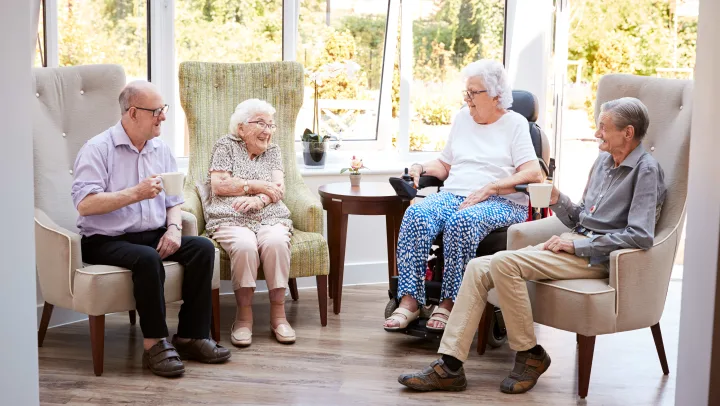Recognizing Exactly How Aided Living Sustains Individuals With Dementia Care Demands
Helped living centers are progressively identified for their pivotal function in resolving the complex treatment demands of clients with dementia. By supplying an organized yet supporting atmosphere, these centers not only advertise safety and security and well-being yet also promote a feeling of autonomy with customized treatment strategies.
Review of Dementia Treatment
Dementia care is significantly vital as the occurrence of dementia-related conditions climbs among maturing populations. This expanding demographic trend necessitates a thorough understanding of mental deterioration and the various approaches to care. Mental deterioration includes a variety of cognitive impairments that hinder day-to-day life, impacting memory, reasoning, and interaction capabilities. The condition can vary significantly in its discussion, calling for customized care strategies to meet specific needs.
Efficient mental deterioration care includes a multidisciplinary method, including clinical, mental, and social support. Health care professionals, caretakers, and household members have to work together to produce a caring atmosphere that advertises the wellness of people with mental deterioration. Key elements of dementia care include customized care plans, cognitive stimulation therapies, and behavioral interventions focused on enhancing top quality of life.
Furthermore, it is necessary to recognize the psychological and emotional obstacles faced by both clients and caretakers. Education and learning and training for caretakers play a critical function in cultivating understanding and compassion, thereby enhancing interactions with those impacted by mental deterioration. As the need for dementia treatment remains to increase, the focus should remain on supplying caring, person-centered treatment that appreciates the dignity and choices of individuals dealing with this problem.
(Charlotte Alzheimer's Care)
Role of Assisted Living Facilities
Helped living centers play an essential duty in offering take care of individuals with mental deterioration, offering a helpful setting that balances freedom with the necessary support. These facilities are made to accommodate the unique requirements of citizens, advertising a sense of area while making sure security and well-being.
In an assisted living setup, skilled employee supply ongoing support, helping with day-to-day tasks such as bathing, clothing, and medicine management. This degree of care is important for individuals with mental deterioration, that may have problem with these jobs because of cognitive decrease. Furthermore, centers often incorporate memory-enhancing programs and social activities customized to stimulate cognitive performance and urge social communication.
The physical environment of nursing home is additionally enhanced for security, including safe entrances, well-lit pathways, and clear signs to aid citizens navigate their surroundings. These communities foster a sense of belonging, minimizing the sensations of isolation that people with dementia might experience.
Personalized Care Program
To guarantee that each resident receives one of the most ideal treatment, individualized treatment plans are important in assisted living facilities for people with dementia. These plans are tailored to satisfy the special demands, preferences, and challenges encountered by each resident, promoting their dignity and high quality of life.
The advancement of a personalized care strategy usually begins with a thorough evaluation conducted by healthcare specialists. Memory Care. This analysis evaluates the person's cognitive capacities, physical health and wellness, psychological well-being, and social choices. Input from relative and the resident themselves is essential, as it offers beneficial insights into their history, routines, and personal rate of interests
When the assessment is complete, a multidisciplinary team collaborates to develop a care strategy that details certain objectives and interventions. This may consist of drug management, daily living aid, and behavior techniques tailored to alleviate anxiety or agitation.
Routine testimonials and updates to the care plan guarantee it continues to be relevant as the person's problem progresses. Assisted Living. By focusing on personalized treatment, aided living facilities can enhance the general well-being of homeowners with dementia, cultivating a setting that respects their uniqueness while resolving their treatment requires successfully
Engaging Tasks and Socialization
Involving activities and socialization play a crucial function in enhancing the lifestyle for citizens with mental deterioration in nursing home. These activities are developed to stimulate cognitive feature, promote psychological well-being, and foster links amongst locals. Structured programs, such as art therapy, music sessions, and memory therapy, give possibilities for people to express themselves creatively while also activating positive memories.
Socializing is just as vital, as it deals with feelings of seclusion and solitude that can come with dementia. Team tasks, consisting of video games, team outings, and public eating, motivate communication and assistance citizens develop encouraging relationships with peers and caregivers. This feeling of community not only enriches their everyday experiences yet likewise adds to an extra steady emotional atmosphere.
Moreover, involving tasks can be customized to private preferences and cognitive levels, making certain that each resident can take part meaningfully. By developing an environment that focuses on involvement and social interaction, helped living facilities can significantly boost citizens' general mental health, promoting a feeling of function and belonging. Eventually, these campaigns are crucial components of extensive mental deterioration care, substantially affecting residents' total wellness and joy.
Advantages of Neighborhood Support

Additionally, area support advertises social interaction, which is essential for cognitive and psychological wellness. Involving with peers and joining team activities can enhance mood and urge reminiscence, adding to a higher sense of belonging. This social engagement is important, as solitude and seclusion can exacerbate cognitive decline.

(Memory Care Charlotte)
Conclusion
To conclude, helped living centers work as essential atmospheres for individuals with dementia, using organized support that cultivates both self-reliance and security. The application of personalized care plans makes sure that each resident's special needs are met, while involving activities advertise social interaction and cognitive interaction. Furthermore, the sense of community within these centers significantly reduces feelings of seclusion, improving overall emotional well-being. Thus, assisted living plays an essential duty in enhancing the lifestyle for individuals with dementia.